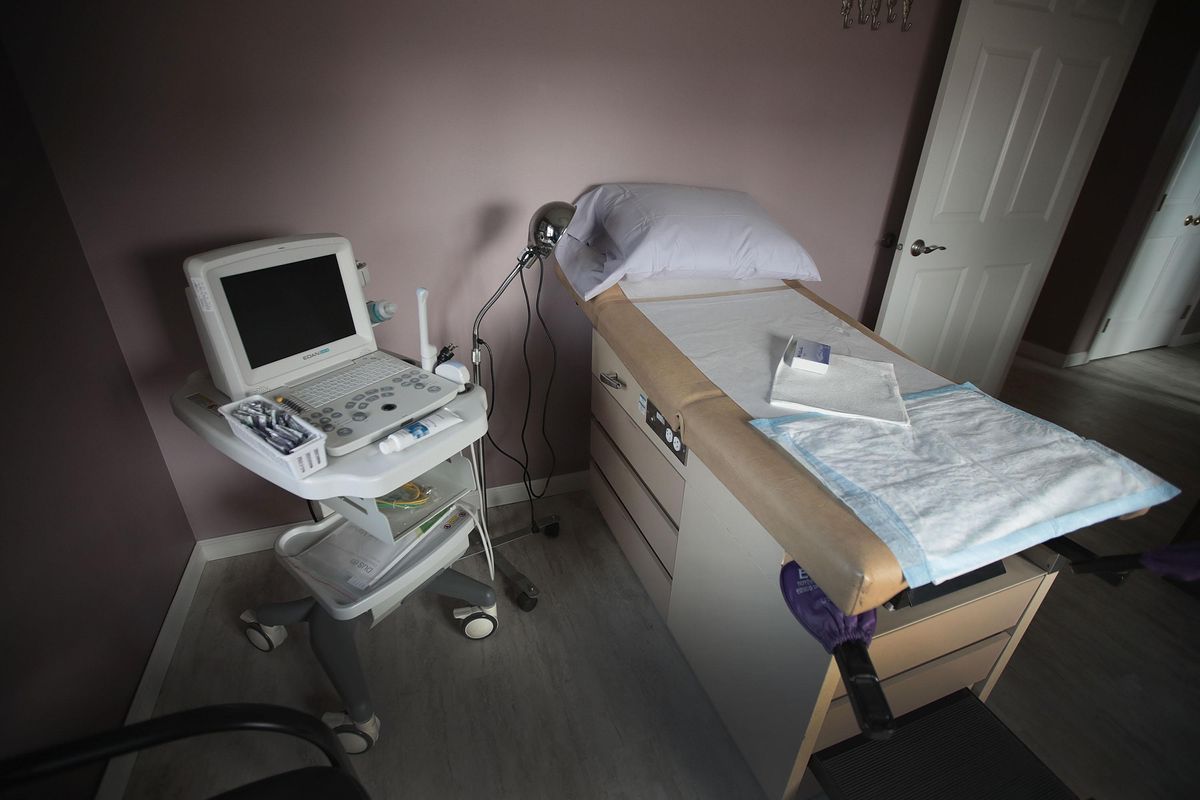January is Cervical Cancer Awareness Month. Here's why cervical cancer screenings are crucial
Cervical cancer is one of the most preventable forms of cancer. So why do women continue to ignore screenings?

An ultrasound machine sits next to an exam table in an examination room at Whole Woman's Health of South Bend on June 19, 2019 in South Bend, Indiana.
It's a universal fact no woman enjoys visiting her OB/GYN. Whether it's for a procedural check-up or a persisting medical issue, a trip to your OB/GYN can often feel as unpleasant as surviving Christmas dinner with your extended, dysfunctional family. Nevertheless, a visit to the gynecologist is a mandatory trip that should be done regularly, but often gets neglected. According to this Mayo Clinic study, nearly two-thirds of women between the ages of 30 and 65 were not up-to-date with their cervical cancer screenings.
That percentage is even lower for women aged 21 to 29.
Routine cervical cancer screenings should happen every three years with a Pap test, or every five years with a Pap-HPV co-test, which ensures precancerous changes are caught early. However, many women tend to neglect these screenings that could impact their lives tremendously.
In addition to the statistics, researchers at Mayo Clinic discovered race also plays a huge role in terms of who's getting screened. Black women of color were 50 percent less likely to be up-to-date on cervical cancer screenings than Caucasian women, with Asian women falling behind by 30 percent.
These new findings are extremely concerning, especially considering cervical cancer is one of the most preventable types of cancer, affecting around 13,000 women each year. What's more, cervical cancer death rates have dropped immensely within recent decades, mainly due to the development of the Pap test in the 1950s.
A routine test involves collecting cells from a woman's cervix, examining them under a microscope to look for precancerous and cancerous cells. There is also a second kind of cervical cancer screening — called the HPV test, — which detects the presence of high-risk HPV (Human Papillomavirus) that leads to precancerous changes and cervical cancer.
Dr. Jennifer Butt, a renowned gynecologist at Upper East Side OB/GYN in New York City, understands this better than anyone.
"Young women are sometimes unsure when screening for cervical cancer should start and how frequent," it should be, she explains. "Some women have had a bad experience with their first OB/GYN visit so fear is definitely one component I've seen."
Dr. Butt also adds younger women tend to be healthier and forget they should see the doctor for routine care, prevention, and screening. However, that doesn't mean those individuals should neglect their screenings altogether.
It is important women visit their OB/GYN every year for their annual routine check up. Regardless of their age, history and previous PAP smears, a PAP may be done as part of that annual exam. Many doctors believe it's a huge misconception that if you don't need a PAP, then you don't need to see the OB/GYN.
One company working to rectify this concerning situation is the consumer health and telemedicine company, Nurx. Just last year, the company introduced a home HPV screening test, which allows women to conveniently and affordably check their risk for cervical cancer at home. Factoring the ongoing COVID-19 pandemic - and fear of an impending second wave - this couldn't be more convenient.
What's more, Nurx aims to remove barriers to care, making it easy for women to get the information they need to make better decisions about their health. So how does it all work?
After answering a few questions about your medical history, Nurx's medical team will determine if a patient is an appropriate candidate for the home test. The testing kit will then be delivered to the patient's home, where they will complete a simple vaginal swab and send the sample back to the lab in a pre-paid envelope. Within a few days, Nurx's medical team will reach out to the patient to discuss their results. Nurx's Home HPV Screening test meets recently updated guidelines, which now offers HPV testing as an appropriate alternative to a pap smear.
Nurx also offers prescriptions for birth control and the HIV prevention medication PrEP. Last year, the company introduced a Home PrEP test kit, allowing people to complete all of the required and recommended lab work from their home. Since the company began offering the test kit, Nurx has seen a vast increase in the request for PrEP and is now the leading online provider of HIV prevention medication.
Although the test is 100% safe, patients shouldn't forgo visiting their OB/GYN's on a regular basis. Nurx designed the home screening kit as a motivational alternative for women who otherwise wouldn't be able to visit their regular OB/GYN. But doctors are hopeful these tests will be a useful and enlightening tool, especially now with the pandemic.
"Better education is paramount," explains Dr. Butt. "Explaining what is a PAP, why we get PAPs, how frequent, what is a screening test - these are all important aspects of a woman's health that surprisingly a good number of women are unsure of."


